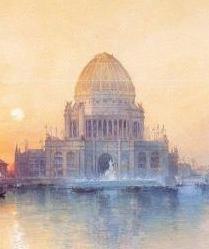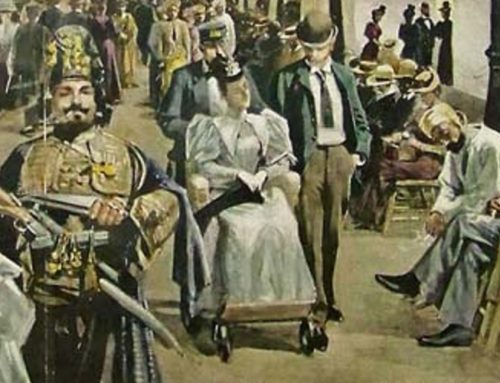“The beautiful statue of Diana which swings as a weather vane above the central dome is one of the great attractions of the Exposition.”
–John J. Flinn in Guide to the World’s Fair Grounds, Buildings and Attractions (Standard Guide Co., 1893)
The short story reprinted here comes from the November 1892 issue of Comfort, a monthly periodical from Augusta, Maine. Just weeks before, Gotham’s golden goddess–who is the subject of this tale–had been removed from her lofty perch above New York City. A few months later Augustus St. Gaudens‘ gilded hunter would rise above the Dream City being constructed in Chicago for the 1893 World’s Columbian Exposition. As the narrator of the story points out, some in the World’s Fair city were taken aback by her “scantiness of her attire,” but the lovely Diana also won the hearts of many who admired her spinning atop the Agricultural Building.
A Goddess in a Fog
by Granville Sharpe
Let me state at the outset that I am not a believer in dreams. Neither is the story I am to tell one of by-gone years after the imagination has had time to weave a romance over the facts in the case. I am dealing in plain, unvarnished truths, which occurred to me, John Westmore, on the evening of August 9, 1892, in the very heart of the city of New York.
I had been living in the West nearly ten years, and having some business in the East came on, partly for that and partly to visit my uncle, who with his family, had been abroad all summer, but who was due in New York several days before I left Denver.
Upon arriving at his handsome residence on Madison avenue, however, I was surprised to learn that he and his family were in quarantine on the lower bay, in common with the other passengers in one of the fated steamers which had come into port bearing that warning emblem—a yellow flag. In other words, he had embarked in a steamer whose steerage passengers had been stricken with cholera!
I was expected, however, by the old family servant who had been left in charge of the house, and he spared no pains to make me comfortable. He catered to my appetite as though he were serving a dinner party, and brought out of the depths of the cellar a bottle of wine twice as old as myself, after which, placing a box of cigars in reach, he left me to my after-dinner reflections.
The library was in front of the house, up one flight, and looked out upon the broad, well lighted avenue. Seating myself in a comfortable arm chair that stood in a large open bay window, I lit a cigar and watched the blue smoke rising above my head in fantastic shapes. I felt a bit dull and gruesome. In all that mighty city, teeming with life, I knew no one. Why had I not kept up my acquaintance with Jack Armitage, my college chum at Princeton? And Jack’s sister, too—what a charming visit I had one vacation at Jack’s home. Daisy was there then, a mere slip of a school girl, full of mischief, withal, but giving promise of a fine woman. I had not thought of her before for years. Why had I buried myself so completely in business that I had time for nothing else? What had the world given me in exchange for my soul? What—
I was not aware I was dozing until my cigar dropped and stung my hand with its expiring fire. I started and opened my eyes. There was a chill in the air and it had grown quite dark. A dense white fog had settled over everything—the street and adjoining houses—all were swallowed up. The raw mist was in my eyes, my throat, my clothing. I breathed it, tasted it, was half suffocated with it. Evidently I had slept longer than I had first supposed.
My head was lying against the back of the chair. Looking straight up my eyes fell upon what would have been sky, but for the fog. Right there, penetrating the mist with a halo of light, shining like burnished gold, I discerned the hair nude, slightly draped figure of a woman!
I stared with suspended breath. My heart beat quickly. Who or what was she? She floated or hovered with marvelous ease in that point in the sky, the superb gold-figure shining through the mist like a sinking sun half concealed by thin white clouds.
Was I dreaming?
I sprang to my feet, paced up and down the room several times, then again approached the window and looked up. Had I indeed dreamed it? No, she was there. I thought of the legend of Venus rising from the sea, but this angelic being was too grandly proportioned for the goddess of beauty and of love. She was magnificent. She might be better likened to some Spartan woman of old, who shared with her husband the dangers of war. Did I not, indeed, see a glimpse of a bow and arrows in her outstretched hand? Or was she beckoning?
I felt for a moment as though my senses were leaving me. Why should this regal being appear to me? I must find out if my senses were serving me true and false. Instinctively I seized my hat and left the house.
The whole city was shrouded in fog. I wandered down the avenue, finally coming to a huge building which occupied an entire block and into the several entrances of which throngs of people were disappearing. I followed the crowd, and presently found myself in a vast amphitheatre, in the center of which a bicycle race was in progress. Tier after tier of faces looked down at the eager riders and now and then a low thunder of applause half drowned the orchestra. I, too, became interested for a few minutes, then I became restless. The golden woman seemed to beckon me on. I mounted stairs and came to the entrance to a theatre. This might amuse me. I soon became one of the audience.
It was an opera, and I watched the ballet dancers for awhile in a reasonable mood. I fancied I would forget the strange sight which had so confused me. Suddenly I rose, impelled again by some feeling I cannot describe, and began to ascend the stairs again. Flight after flight were ascended, until a welcome rush of cool air came toward me, and I found myself upon a roof garden. The clear sky was above me gleaming with stars—below lay the fog like a mantle.
“Why Mr. Westmore, can it be possible? How do you do?”
The voice was familiar, so was the face of the elderly gentleman to whom it belonged. As I shook hands with him I recognized him as Jack Armitage’s father.
“We have just been speaking of you, Jack and I,” went on the old gentleman. “Yes, Jack” is here, somewhere, and so is my daughter. Daisy you remember Mr. Westmore do you not? I wonder where Jack went. He was saying a moment ago that he would like to hear from you, but had lost your address!”
At Mr. Armitage’s side stood a tall graceful woman, with a sweet strong face, whom I could hardly recognize at first as the mischievous girl of ten years before. It was agreed that we should find Jack while Mr. Armitage, who suffered with a slight lameness, awaited us there. I managed things so skillfully that it was some minutes before we found him, and in the meantime revived my acquaintance with his sister as best I could.
“Have you seen Diana?” she asked. “Jack told papa and me that we must see her, so we came with him this evening. Is she not a noble work of art?”
I followed the direction of her gaze, and there, ye Gods! crowned with electric light, and grasping a bow and arrows, I saw the golden woman! The mystery was solved. The famous statue over-looking Madison Square garden, was she who had appeared to me above the fog in all her yellow splendor, and by the witchery of her gaze had drawn me thither—where the witchery of another pair of eyes was making me a willing captive for life?
Diana’s reign was over, but I still believe in her power, not withstanding that certain residents of the World’s Fair city have refused since then, to accept my golden goddess within their sacred precincts, on account of the scantiness of her attire!
What else could it have been but a spell from her, that guided me that evening to my old college chum, and to the dearest and most noble woman I have ever known?

A photograph of Madison Avenue and 26th Street in New York, showing the tower of Madison Square Garden topped by Augustus St. Gauden’s Diana. [Image from the Irma and Paul Milstein Division of United States History, Local History and Genealogy, The New York Public Library.]






Leave A Comment